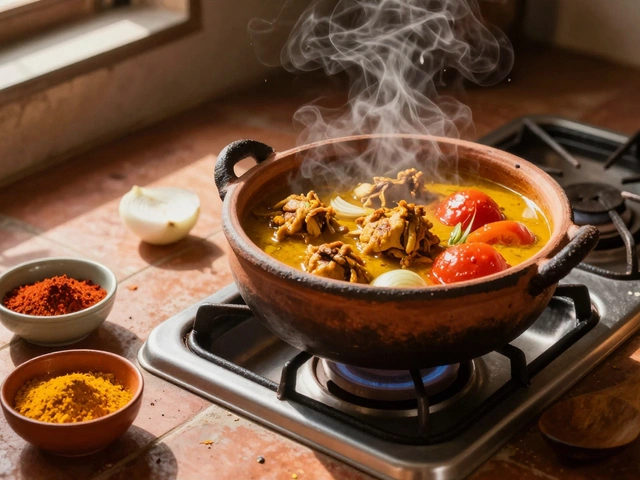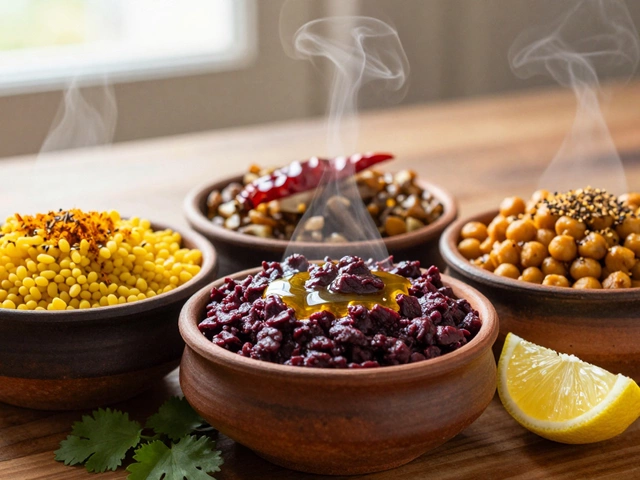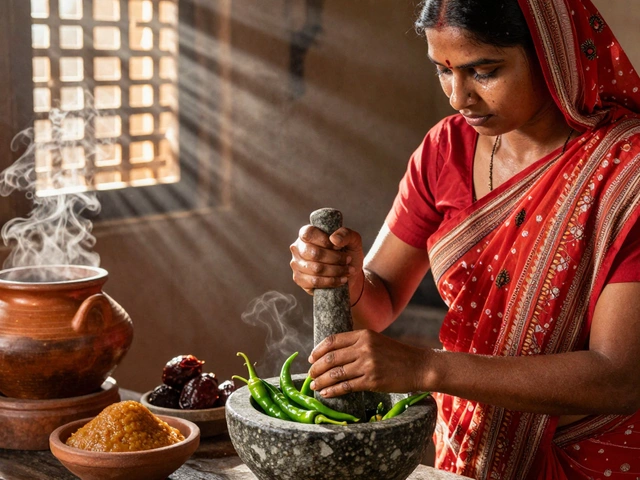Ever wondered why so many Sikh breakfasts are vegetarian? The answer sits deep in Sikh teachings. The Sikh code of conduct—called the Rehat Maryada—asks followers to avoid certain foods to keep life pure and simple. That means some stuff is off the table, literally.
If you’re thinking about grabbing a quick breakfast in India and you want to respect Sikh food guidelines, you have to know what to skip. Meat, eggs, and even some animal-based products won’t make the cut. Plus, there are a few tricky ingredients hiding in packaged foods that can cause a problem.
You don’t have to get lost or overwhelmed. Once you know which foods are forbidden and why, planning your Sikh-friendly breakfast becomes a breeze. And honestly, some of the most delicious and filling Indian breakfast dishes are already in line with these rules—think about soft poha, aloo paratha, or chana masala on hot toast.
- Sikh Teachings on Food
- Why Meat Is Usually Avoided
- The Truth About Eggs and Fish
- Rules Around Alcohol and Tobacco
- Hidden Ingredients to Watch Out For
- Easy Sikh-Friendly Breakfast Ideas
Sikh Teachings on Food
The rules around food in Sikhism aren't just old family traditions—they come straight from the religion’s main texts and community practices. The main idea? Eat simply and avoid foods that mess up the mind or body. According to the Sikh code called Rehat Maryada, Sikhs are told to avoid meat that has been killed in a ritual way (like halal or kosher) and in many cases, meat in general is left out of daily meals, especially in anything prepared for religious or community settings.
The reason behind this is respect for all life and the goal of not letting what you eat cloud your judgment or bring violence into your body. Plus, Sikhs want their eating choices to match their values. In community kitchens, or langars, served at every gurdwara, you’ll only find strictly vegetarian food. This means everyone, no matter their background, can eat together without worry. That’s inclusion in action.
There’s another important piece: Sikhs are guided to avoid food and drink that can make you lose control, like alcohol or tobacco products. That comes straight from their spiritual outlook—keeping the mind clear and focused on what matters is the real goal.
So if you’re thinking about a Sikhism-friendly breakfast, you’ll want to skip the meat, stay away from alcohol, and check your food labels to keep things simple and respectful. Sticking to basics often makes breakfast fast, easy, and in line with Sikh teachings.
Why Meat Is Usually Avoided
Sikhism encourages followers to live a life that avoids unnecessary harm. That’s the core reason why meat is usually off the plate for Sikhs. The official Sikh code, Rehat Maryada, says that any food sacrificed as an offering during religious rites (kutha meat, often associated with halal or kosher) is not allowed. So, even more than plain old chicken or mutton, meat from animals slaughtered in specific religious ways is especially forbidden.
Now, while there’s some debate among Sikhs about eating meat in general, most practicing Sikhs keep it simple and stick to a vegetarian diet, especially during religious gatherings and in the gurdwara (Sikh place of worship). Every meal cooked or eaten in a gurdwara (called langar) is 100% vegetarian. This isn’t just tradition; it’s so that everyone, no matter their background, can sit and eat together without worry. Inclusivity is crucial.
Here’s the official breakdown:
- Meat prepared as a religious sacrifice (kutha) is always forbidden for Sikhs.
- Most Sikhs avoid all meat at home, making daily meals like quick breakfast 100% vegetarian.
- Eggs and seafood are often also skipped, but this can vary by family or region.
To get a sense of how common vegetarianism is in Sikhism, check out this quick snapshot:
| Setting | Usual Practice |
|---|---|
| Gurdwara/Langar | Strictly Vegetarian |
| Sikh Family Homes | Mostly Vegetarian |
| Personal Choice (Outside Ritual) | Some Eat Meat, Many Don't |
If you ever step into a Sikh community kitchen, you’ll notice that nobody asks who you are or what you believe—they just hand you a steaming plate of tasty, simple, vegetarian food. That’s how the Sikhism tradition turns food into a big, inclusive deal, not just a personal choice.
The Truth About Eggs and Fish
Here’s where things get a bit tricky for breakfast in India: eggs and fish are a big no for Sikhs who follow tradition closely. It’s not just red meat that’s off-limits—the Sikhism dietary code generally treats eggs and all kinds of seafood just like other non-vegetarian foods. So your masala omelette or fish cutlets don’t fit the bill if you’re keeping with Sikh rules.
The reason? Sikhism puts a lot of value on compassion for all living things. Most Sikhs avoid anything that involves taking a life, and that includes eggs (even unfertilized ones) and every kind of fish or seafood. The code, called Rehat Maryada, puts all animal flesh under the same umbrella. It’s not just a health thing. It’s about the principle of not harming creatures.
If you check out a gurdwara (Sikh temple) kitchen serving langar, you’ll never spot eggs, fish, or any animal by-products in the food. Even stuff like mayonnaise, which can sneak eggs into dishes, is left out of proper Sikh kitchens. This goes for home breakfasts too—no egg sandwiches, no tuna salad, nothing that comes from animal flesh.
It might sound like you lose out on quick protein for breakfast, but the flip side is there are loads of plant-based protein sources in Indian cooking. Beans, dal, paneer (for those who eat dairy), and chickpeas all show up in Sikh-friendly breakfasts. You won’t really miss the eggs or fish once you get into the groove. If you’re ever in doubt, just stick with pure veggie dishes and you’ll stay on the safe side.

Rules Around Alcohol and Tobacco
The rules don’t get much clearer than this—alcohol and tobacco are totally forbidden in Sikhism. The Sikh code, the Rehat Maryada, says followers shouldn’t drink booze or use any intoxicants. Why? These substances mess with your mind, dull your conscience, and go against the Sikh focus on living a sharp, mindful life.
It’s not just about heavy drinking or smoking either. Even in social settings where a bit of alcohol seems harmless, it’s a strict no from the Sikh teachings. These rules apply across the board, whether you’re at home, out with friends, or grabbing a quick breakfast. You’ll never find alcohol or tobacco served in a gurdwara (Sikh place of worship). Actually, you won’t even be allowed in if you have any of this stuff on you—many gurdwaras display this rule right at the entrance.
This is serious business. The most recent studies in Punjab (where most Sikhs live) show that among practicing Sikhs, over 90% completely avoid alcohol and tobacco, sticking tight to the faith’s teachings. Here’s a quick look at what the data says:
| Substance | Percentage of Practicing Sikhs Who Avoid |
|---|---|
| Alcohol | ~94% |
| Tobacco | ~97% |
If you’re out shopping for a Sikhism-approved breakfast food, keep your eyes on labels. Even some bakery items, sweets, or packaged foods can surprise you with alcohol-based flavorings or tobacco (like in some paan or mouth fresheners). A quick ingredient check can save you from breaking the rules by accident.
If you want to live by Sikh values or just cook for someone who does, keep these two things totally out of your kitchen. It’s simple, but super important for practicing Sikhs.
Hidden Ingredients to Watch Out For
Even if you’re skipping obvious things like meat and eggs, you still have to watch for sneaky animal products or forbidden items in processed or packaged foods. Lots of snacks and ready-to-eat meals can hide ingredients that don’t fit Sikh food rules.
Let’s talk about some common culprits to look out for in your breakfast:
- Sikhism asks followers to avoid meat, but so many biscuits and breads in India secretly use eggs or animal fats—sometimes called “lard” or “shortening”—in their recipes.
- Some flavored yogurts and cheese spreads use gelatin, which comes from animal bones. It doesn’t show up as “meat,” but it means the product isn’t vegetarian-friendly.
- Pre-mixed pancake batters or instant dosa mixes can use powdered eggs for better texture. Always read the ingredients.
- Breakfast cereals or granola bars sometimes include marshmallows or other chewy bits made with gelatin.
- Instant soups or noodles often have hidden chicken or beef extracts—even when the flavor is “plain” or “masala”.
- Look out for non-vegetarian E numbers or additives. Not every E number is animal-based, but a quick online search for the code can save you trouble.
What’s the fix? Indian food packaging often uses a mandatory green dot for pure vegetarian products and a brown dot for non-vegetarian items. That green dot is your friend. When eating out, don’t be shy to double-check with the cook or server—sometimes even “veg” hot dogs or patties in bakeries contain egg without being obvious.
If you want total peace of mind, stick to homemade options or brands you trust. When in doubt, keep it simple with old-school Indian breakfast classics like upma, parathas, and fresh fruit—no ingredient lists required.
Easy Sikh-Friendly Breakfast Ideas
If you want to stick to Sikhism dietary guidelines, breakfast is actually one of the easiest meals to get right. There are loads of Indian options that fit Sikh rules perfectly—no meat, no eggs, no fish, and no alcohol. And for many, that means delicious, filling choices using ingredients you probably already have at home.
- Poha: This is a staple for busy mornings, made from flattened rice, peas, peanuts, onions, turmeric, and a little lemon. It’s naturally vegan and comes together in less than 20 minutes.
- Aloo Paratha: Stuffed with spiced mashed potatoes, these simple flatbreads are usually cooked in ghee or oil. Just avoid using butter if you’re at a gurdwara (temple), since dishes should be free from animal rennet.
- Chana Masala on Toast: Instead of egg on toast, top your bread with spicy, protein-rich chickpeas. It’s simple, packed with flavor, and keeps you full until lunchtime.
- Upma: Semolina cooked with veggies, mustard seeds, and curry leaves. This is a quick, nutritious, and totally plant-based option.
- Sabudana Khichdi: Tapioca pearls simmered with potatoes, peanuts, and mild spices. It’s a favorite during fasting days and naturally aligns with Sikh food guidelines.
A big plus? You don't need to do major label reading for these homemade classics. But if you do reach for packaged foods—like bread or ready-to-eat mixes—scan for hidden animal fats or eggs.
Here’s a handy chart showing what’s in these breakfast picks and how they check the Sikh-friendly box:
| Breakfast Dish | Totally Vegetarian | No Hidden Animal Fats | Ready in 20 Minutes? |
|---|---|---|---|
| Poha | Yes | Yes | Yes |
| Aloo Paratha | Yes | Usually* | No (needs prep) |
| Chana Masala on Toast | Yes | Check Bread | Yes |
| Upma | Yes | Yes | Yes |
| Sabudana Khichdi | Yes | Yes | Yes |
*If making at home, use oil or plant-based butter. Some store-bought ghee can have animal rennet, so homemade is best.
If you’re new to this, start simple. Swap eggs for lentils or chickpeas, use plant oils over butter, and keep your ingredient list short and familiar. Not only does this stick to Sikh values, it also makes busy mornings a little easier—no overthinking required.





